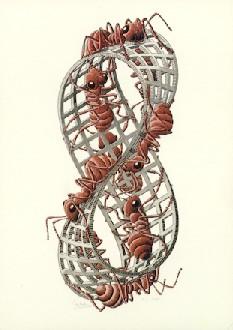Nick Soapdish
Secret Agent
SoliDeoGloria,
Thank you for taking the time to respond. As a working father I know exactly what you mean.
In general, you have implied that either we have 100% control over our actions, or we have 0%. Why does it have to be either/or? Is it not possible for us to have multiple influences on us? For example, I could have hunger, guilt and laziness all factor into a decision I make. It seems under your line of thought, we could not have multiple influences; that only one thing causes us to do something at a time. If we can have multiple things influence us, then why can't one of those things be an internal determination, that if strong enough, can overcome our bodily impulses?
But let me turn the question back on you. Do you believe that if we had complete knowledge of all impulses that a person has, we could predict their decision with 100% accuracy? If you believe this, then I am wondering what you are basing it on, and if you do not believe this, then I say we have freewill.
Thank you for taking the time to respond. As a working father I know exactly what you mean.
I am not so sure. After reading through your entire response, you seem to have the impression that if there is any external inspiration or basis then we cannot have any freewill. I must remind you that my argument includes the existence of external influences, so pointing out that there are external influences does not invalidate my argument.SoliDeoGloria said:The title was just an attempt at getting people's attention, no more. In other words, That is not the way I see things.
In general, you have implied that either we have 100% control over our actions, or we have 0%. Why does it have to be either/or? Is it not possible for us to have multiple influences on us? For example, I could have hunger, guilt and laziness all factor into a decision I make. It seems under your line of thought, we could not have multiple influences; that only one thing causes us to do something at a time. If we can have multiple things influence us, then why can't one of those things be an internal determination, that if strong enough, can overcome our bodily impulses?
Are you suggesting that there is 0% internal creativity that feeds into the art; that it is all just regurgitating what we already have experienced?SoliDeoGloria said:Even our creative side has a a base to it and a reason behind it. For example even artists use reality as inspiration. Even abstract art has emotions behind it and even driving it. I would love for someone to name something "creative" that had absolutely no inward or outward inspiration (Ecc. 1:9).
We have an awareness that allows us to understand things in a way that surpasses mere logical steps of deduction. There are mathematical problems called Diophantine problems that have been solved by mathematicians which are simply not solvable through any algorithmic means. If an algorithm could not solve them, then how does the mathematician without any sort of creativity or freewill?SoliDeoGloria said:The whole definition of the word "critical" begs to differ the description given above.
I do not follow this. Please explain how our consciousness alters our impulses.SoliDeoGloria said:So either our impulses or consciouces is in control of our wills. My favorite part of this argument is the last sentence, because if it is true than it must also be true that if our consciousness alters our impulses, since they both drive our wills, then our "freewill" has once again become impotent.
I do not see how you have concluded this. Perhaps it has to do with your association that our consciousness somehow alters our impulses. I suspect that I may not have adequately expressed my position because I do not follow your response.SoliDeoGloria said:Either way, the only logical conclusion of this argument is that whenever any influence that drives our wills is altered, it takes away the potency of out "freewills".
I will believe it when I can read a scientific journal and understand exactly what Pate de Lapin tastes like from a fine restaurant in France. Otherwise, I will just have to go to France and let my consciousness experience it for itself.SoliDeoGloria said:On top of that, I'm sure science can come up with an argument stating that our conscious is just as much a part of our bodies as our "impulses".
Once again, I have not denied that our actions are driven from our experience and our biology. My contention is that it is an internal determination that chooses which impulse to follow.SoliDeoGloria said:Name an inpulse as you defined above that is not considered a law of nature(the impulse for survival, the impulse for pleasure, etc). After that, name an issue of the conscious, like morality, logic, etc. that was not taught or had any sort of external influence.
But let me turn the question back on you. Do you believe that if we had complete knowledge of all impulses that a person has, we could predict their decision with 100% accuracy? If you believe this, then I am wondering what you are basing it on, and if you do not believe this, then I say we have freewill.
Perhaps you could elaborate which passages of the Bible you believe eliminate our freewill first, so I know if I am addressing your contention properly.SoliDeoGloria said:please do


